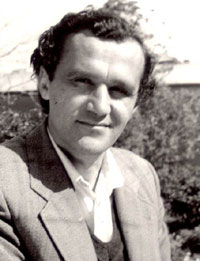Moikom ZEQO

For Gabriel García Márquez
Even after a thousand years of solitude
The tree of the heart does not wither.
One day even flowers
Will grow on the moon.
We therefore believe
That the mythical autumns of the patriarchs
With their value-added nuclear sceptres
Are fossilized images.
You longed for pure air
Over the continents!
Your identity deriving from the titles of your books,
How many people your name contains!
[Gabriel Garsia Markezit, from the volume Njëqind zemra, Tirana: Naim Frashëri 1989, p. 88, translated from the Albanian by Robert Elsie, and first published in English in An elusive eagle soars, anthology of modern Albanian poetry, London: Forest Books 1993, p. 178]
The double
When the Roman consul Lucus Anitius gave orders
For the legions to march into the Illyrian heartland
He had not only a chronicler on his war council
But also a double of King Gentius,
Dressed just like him, with painted eye-brows
Most certainly with a false sceptre,
And with a sentence learnt by heart:
"I am Gentius, King of the Illyrians!"
The consul said to the chronicler that day
"What happens to the real Gentius is of no consequence to the battle. We are the truth and shall spread it as we wish,
The tools of writing are the arms of victory too,
Words which the most distant of our descendants will read.
The shackles of Roman victories must not fall
Even though they are made of paper!"
When Lucus Anitius celebrated his 'Illyrian triumph' in Rome,
Riding his martial chariot and crowned with golden laurels
The double walked in front of him,
Moaning loudly, so as to be heard by all:
"I am Gentius, King of the Illyrians!"
The masses roared and made fun of the captive.
The official chronicle attributed to the ancient spectacle
'Universal' significance!
[Sozia, from the volume Njëqind zemra, Tirana: Naim Frashëri 1989, p. 108, translated from the Albanian by Robert Elsie, and first published in English in An elusive eagle soars, anthology of modern Albanian poetry, London: Forest Books 1993, p. 179]
Anna Comnena
When the Emperor Alexius uncovered the plot
Of his ambitious daughter, Anna Comnena,
Princess of Byzantium,
He cut her hair and made her a nun.
She thereafter took to writing on parchment
And chronicled the startling history of the century,
Of the city of Durrës, the Norman sieges,
Of Komiskortes, hero of the Arberians.
Anna Comnena, princess of Byzantium,
Her hair shorn, grown old over her writings,
Wrote of the beard of Bohemund Guiscard
Which the people of Durrës had once insulted in public!
And this was all of greater value
Than her dreams of power.
Condemned to live the life of a nun,
She wrote and devoted herself to her times.
[Ana Komnena, from the volume Njëqind zemra, Tirana: Naim Frashëri 1989, p. 123, translated from the Albanian by Robert Elsie, and first published in English in An elusive eagle soars, anthology of modern Albanian poetry, London: Forest Books 1993, p. 180]
Antigonia
Pyrrhus the Great razed many a city,
Destroyed temples, toppled statues of kings,
He rivalled death itself,
And surpassed destruction by fire.
But for his wife, Antigonia the fair,
For whom his love was indestructible,
Pyrrhus the Great ordered that a whole city be built,
High up on a mountain, as close as possible to the sun,
In expanses reserved for the gods alone,
Such was his desire to immortalize in the light
The so mortal face of his spouse.
He gave a whole city
The name of his wife who had passed away
In the unrelenting progress of time.
For the first time
He laid foundations,
Built squares where children would frolic,
Dug wells that would never dry up.
So much the old warrior achieved,
So much death's rival accomplished.
Only this time,
In the name of life!
[Antigonea, from the volume Njëqind zemra, Tirana: Naim Frashëri 1989, p. 129, translated from the Albanian by Robert Elsie, and first published in English in An elusive eagle soars, anthology of modern Albanian poetry, London: Forest Books 1993, p. 181]
On my elderly aunt
She is elderly, wears thick eyeglasses
Knows nothing of telescopes,
Sees clearly into hearts, memories, beyond time.
She is elderly, terse in her speech,
With old sayings,
Laconic gestures.
She is elderly and finds in her grandchildren
That which old age has deprived her of.
She is elderly, her hair has gone grey,
She does not like us mentioning her hair,
Like a poet editing out the clichés.
She is elderly and certainly knows nothing
About Archimedes' principle, about short circuits,
About the number B from elementary school,
About multiplication tables and DNA,
But she does know about bread, growing up and about children.
She is not the least interested in the secret of the metaphor
But does understand the chirping of the wagtails perfectly.
She is elderly, chats quietly
With her brother (my father) who has been dead for thirty years,
Asks him questions, listens to him and replies.
This is more important than Homer's imagination
Which sent Ulysses on his voyage to the other world
And brought him back to life.
My aunt tells her secrets to the dead
Who visit her, drink coffee with her,
Tell her things.
It does not worry her at all
That they are preparing for her return visit.
My aunt is elderly, she very rarely says anything,
But knows the names of all her newly born grandchildren,
Dreams of them getting married,
In a quarter, a half or three centuries' time.
She still keeps her wedding veil
With which to cover her face
The day we pay homage
To her absence so packed with life.
[Për hallën plakë, from the volume Njëqind zemra, Tirana: Naim Frashëri 1989, p. 131, translated from the Albanian by Robert Elsie, and first published in English in An elusive eagle soars, anthology of modern Albanian poetry, London: Forest Books 1993, p. 182]
|
![]()
BACK

